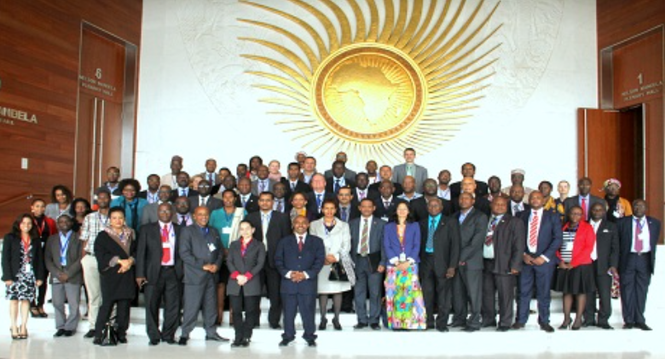
Addis Ababa, 2 July 2015 – In the event of a natural disaster, clear rules and procedures can speed humanitarian relief for affected communities and ensure that national authorities remain in the driver’s seat of an operation. Without such rules, international relief efforts often become snarled in red tape around visas, customs, tax and other official permissions – or undermine local efforts through poor quality, and poorly coordinated activities.
“We have seen these problems time and again,” said Mr Alasan Senghore, IFRC Director, Africa, “There are still far too few countries in Africa that have developed clear rules for managing disaster relief operations. The same applies at the regional and global levels, where clearer rules are needed.”
Today, and following from a joint consultation at the African Union, the International Federation of Red Cross and Red Crescent Societies (IFRC), African National Red Cross Red Crescent Societies, and member states announced the importance of prioritizing the development of effective international disaster response laws.
In 2007, the state parties to the Geneva Conventions adopted “Guidelines for the domestic facilitation and regulation of international disaster relief and initial recovery assistance” (IDRL Guidelines) to help states to develop their own procedures. To date, 19 countries around the world have adopted new rules or procedures drawing on the IDRL Guidelines, including four countries in Africa. At the global level, the United Nations’ International Law Commission is currently finalizing the first draft of what might become a general treaty on the cooperation in disasters.
On 30 June and 1 July 2015, the IFRC and the African Union Commission (AUC) held a consultation meeting on law and disasters, to seek the views of AU member states, National Red Cross Red Crescent Societies, regional economic cooperation secretariats and other partners, on how to reinforce laws on international disaster response and how to advance on domestic laws for reducing the risks of disasters locally. The event brought together representatives from more than 20 African governments, disaster management agencies, National Red Cross Red Crescent Societies, African regional economic communities, UN agencies, and academia, to identify legal priorities in the context of disasters, including international response, disaster risk reduction and gender-based violence in emergencies.
“Effective legal frameworks have a clear role in strengthening the prevention and response to disasters. We believe that states can also promote this at the regional and international level, to create an enabling environment for more effective disaster response in Africa,” stated Dr Khabele Matlosa, Director of Political Affairs, African Union Commission.
Participants at the meeting endorsed the need for stronger domestic laws, and affirmed the need for a strong international disaster response framework. The question will be submitted to a high-level discussion at the 32nd International Conference of the Red Cross and Red Crescent, taking place in Geneva in December 2015.
Note to editors:
In 2007, the IDRL Guidelines were unanimously adopted by National Red Cross and Red Crescent Societies and the states parties to the Geneva Conventions. The IDRL Guidelines propose recommendations for states in reviewing their laws and procedures to better implement effective humanitarian response.
The International Federation of Red Cross and Red Crescent Societies (IFRC) is the world’s largest volunteer-based humanitarian network, reaching 150 million people each year through its 189 member National Societies. Together, IFRC acts before, during and after disasters and health emergencies to meet the needs and improve the lives of vulnerable people. It does so with impartiality as to nationality, race, gender, religious beliefs, class and political opinions. For more information, please visit www.ifrc.org. You can also connect with us on Facebook, Twitter, YouTube and Flickr.
For further information, please contact:
In Addis Ababa:
- Nadia Khoury, Coordinator for Africa, Disaster Law Programme, IFRC
Mobile: +251 912 500 620, E-mail: nadia.khoury@ifrc.org - Emebet Negussie, Disaster law programme officer, IFRC Africa
Mobile: +251 935 987 283, E-mail: emebet.negussie@ifrc.org
In Geneva:
- David Fisher, Global coordinator, Disaster Law Programme, IFRC
Mobile: +41 79 820 6466, E-mail: david.fisher@ifrc.org - Benoit Carpentier, Team leader public communications, IFRC
Mobile: +41 792 132 413, Email: benoit.carpentier@ifrc.org